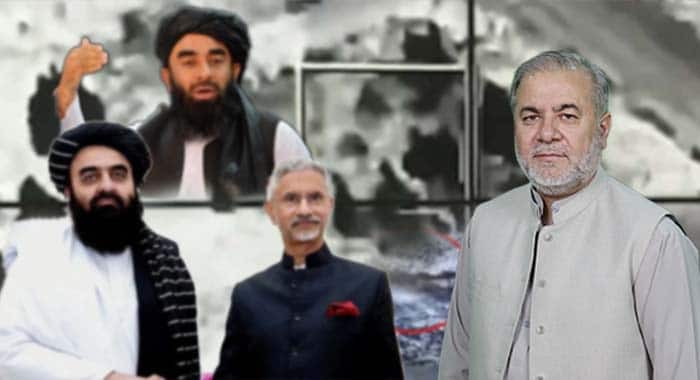Mushtaq Yusufzai
Pakistan’s recent strikes on 27 terror camps inside Afghanistan came at a strikingly symbolic moment when Afghan Foreign Minister Amir Khan Muttaqi was on an official visit to India. The timing raises profound questions about shifting regional dynamics, the erosion of Pakistan’s diplomatic leverage, and the resurgence of Indian influence in Kabul.
For over two decades, Pakistan bore the human and strategic costs of the Afghan conflict. Thousands of Pakistanis lost their lives, and entire generations in the border regions were shaped by the turmoil next door. It was Pakistan’s support logistical, political, and moral that helped the Afghan Taliban reclaim power in August 2021. Many of the Taliban’s current leaders were educated in Pakistani schools and universities; their formative years, social networks, and even their sports training owe much to Pakistan.
Yet, what began as a fraternal bond has now descended into hostility. In the months following the Taliban’s return, relations that once appeared unshakable have soured. The very government that Pakistan once nurtured now finds itself at odds with Islamabad, while courting closer ties with New Delhi a development that exposes Pakistan’s growing diplomatic isolation in the region.
When the Taliban assumed control of Kabul in 2021, Indian policymakers were visibly disheartened. Their multi-billion-dollar investment in Afghanistan’s reconstruction seemed lost, and Pakistan appeared to have gained the upper hand. But over time, India’s patient diplomacy, strategic persistence, and outreach have borne fruit. The fact that Muttaqi, once critical of India due to its stance on Kashmir, was welcomed in New Delhi and signed agreements there, reflects a remarkable diplomatic turnaround.
Diplomacy, as I have often said, is a long-term investment and in this field, Pakistan has repeatedly failed to play the long game. We cultivated the garden of Afghanistan for decades, but when the crop was finally ready, others reaped the harvest. This is not a failure of the military; it is a failure of sustained, visionary diplomacy.
Pakistan’s security establishment has accused India of fomenting terrorism through Afghan soil, and such concerns may not be unfounded. Yet, the current approach of military action without a coherent diplomatic framework risks deepening hostility without yielding sustainable results. Afghanistan is now an independent, sovereign state with its own policies, interests, and growing partnerships. It no longer operates within Pakistan’s strategic orbit.
The current border closures from Chitral to Chaman, Kharlachi to Ghulam Khan have choked trade and stranded thousands of vehicles on both sides. The daily losses run into crores, but Afghanistan bears the heavier burden. Its economy relies on access to Pakistani markets and ports, yet rising tensions threaten to cripple that dependency. The consequences are not limited to governments; they directly affect the millions of Afghans who have invested, lived, and worked in Pakistan for decades.
We must recognize that conflicts are never resolved through force. Even the world’s most powerful military, the United States, had to sit across the table from the Afghan Taliban with Pakistan’s mediation to end a two-decade war. Dialogue, not hostility, remains the only viable path forward.
Unfortunately, Pakistan’s recent “negotiations” with the Taliban and the TTP were superficial at best more ceremonial than substantive. Instead of structured talks led by empowered negotiators, we sent envoys carrying messages and returned with little more than photo opportunities and gifts. Genuine dialogue requires authority, clarity, and political will not symbolic delegations.
As tensions rise, Pakistan must rethink its border policies and diplomatic posture. The complete closure of crossings and the suspension of trade are not solutions. Instead, the two countries must restore communication channels and involve regional partners such as China, Qatar, and Turkey who have previously helped bridge divides.
At home, political leaders must also learn that diplomacy begins within. The widening gulf between the Khyber Pakhtunkhwa government and the federal authorities only compounds national weakness. Dialogue should not be treated as an act of defiance but as a duty toward the people. As I have said, this is not an enemy army we are dealing with it is our own state, our own system.
Pakistan’s true test now lies in its ability to convert confrontation into conversation with Afghanistan, with its neighbors, and within its own borders. Because in the end, wars may silence guns, but only diplomacy secures peace.





